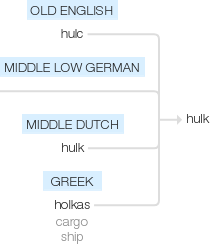Hulk
Old English hulc ‘fast ship’, probably reinforced in Middle English by Middle Low German and Middle Dutch hulk ; probably of Mediterranean origin and related to Greek holkas ‘cargo ship’.
wiktionary
The noun is derived from Middle English hulk(“hut; shed for hogs; type of ship; husk, pod, shell; large, clumsy person; a giant”)[and other forms] [1] (probably reinforced by Middle Dutch hulk[and other forms] and Middle Low German hulk[and other forms]), [2] from Old English hulc(“light ship; heavy, clumsy ship; cabin, hovel, hut”); further etymology uncertain, but probably related to Ancient Greek ὁλκάς(holkás, “ship being towed; cargo ship; ship used for trading”) (compare Ancient Greek ἕλκω(hélkō, “to drag”), of Mediterranean origin, [3] or from Proto-Indo-European *selk-(“to draw, pull”)).
The verb is derived from the noun. [4]
A variant of holk(“to dig out, hollow out, make hollow; to dig up, excavate; to dig into, investigate”), [5] from Middle English holken(“to dig out, hollow out; to dig up, excavate”) [6] (compare holk(“a hollow; body cavity”)), [7] from Proto-Germanic *hulaz(“hollow”, adjective); [8] further etymology uncertain, perhaps either from Proto-Indo-European *ḱel-(“to cover”), or *ḱewh₁-(“to swell; to be strong”).
etymonline
hulk (n.)
Old English hulc "light, fast ship" (glossing Latin liburna, but in Middle English a heavy, unwieldy one), probably from Old Dutch hulke and Medieval Latin hulcus, perhaps ultimately from Greek holkas "merchant ship," literally "ship that is towed," from helkein "to pull, draw, drag" (from PIE root *selk- "to pull, draw").
"[A] word of early diffusion among the maritime peoples of Western Europe" [OED]. Meaning "body of an old, worn-out ship" is first recorded 1670s. The Hulks ("Great Expectations") were old ships used as prisons. Sense of "big, clumsy person" is first recorded c. 1400 (early 14c. as a surname: Stephen le Hulke).
HULK. In the sixteenth century the large merchantman of the northern nations. As she grew obsolete, her name was applied in derision to all crank vessels, until it came to be degraded to its present use, i.e., any old vessel unfit for further employment. [Geoffrey Callender, "Sea Passages," 1943]
hulk (v.)
"to be clumsy, unwieldy, or lazy," 1789, from hulk (n.) or a back-formation from hulking. Meaning "rise massively" is from 1880. Related: Hulked; hulking.
